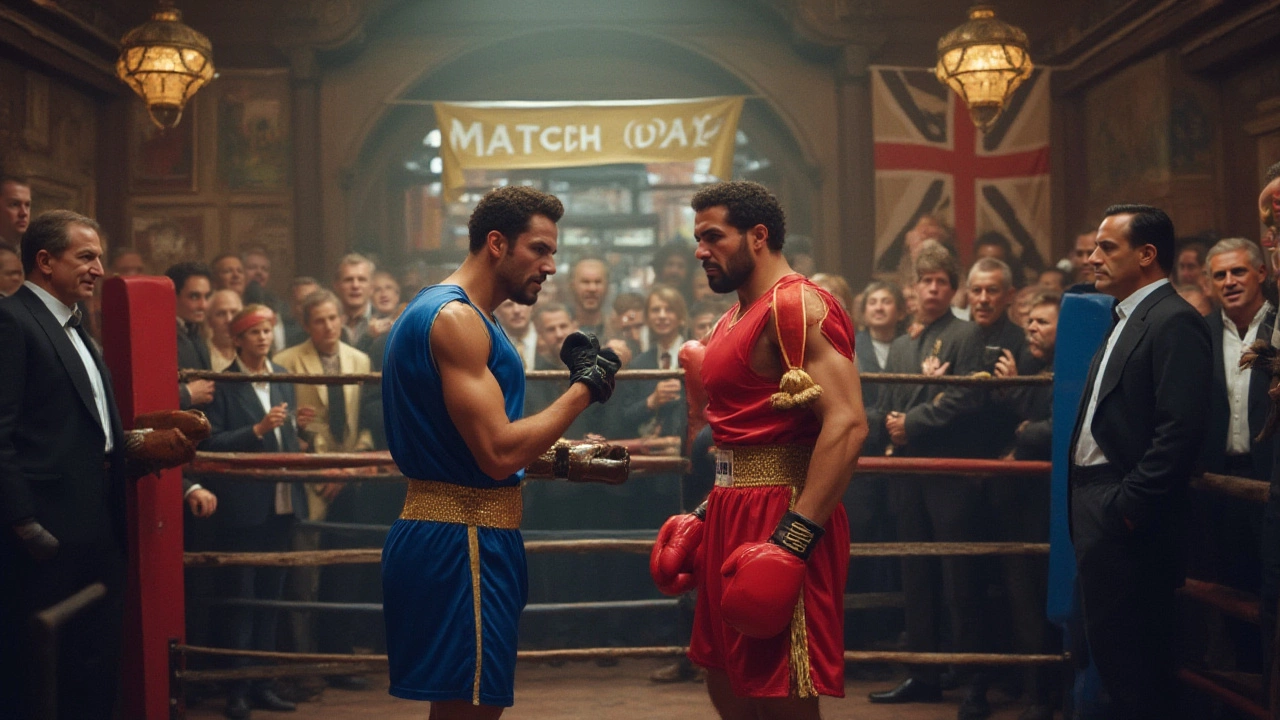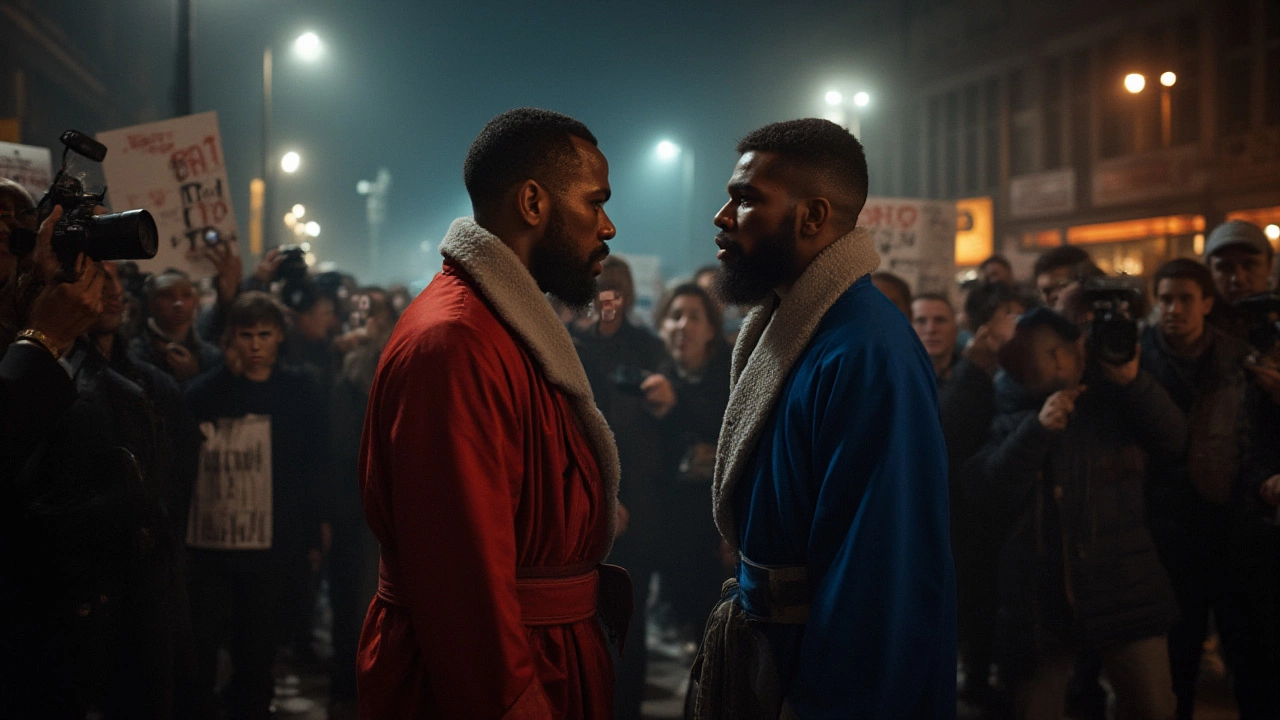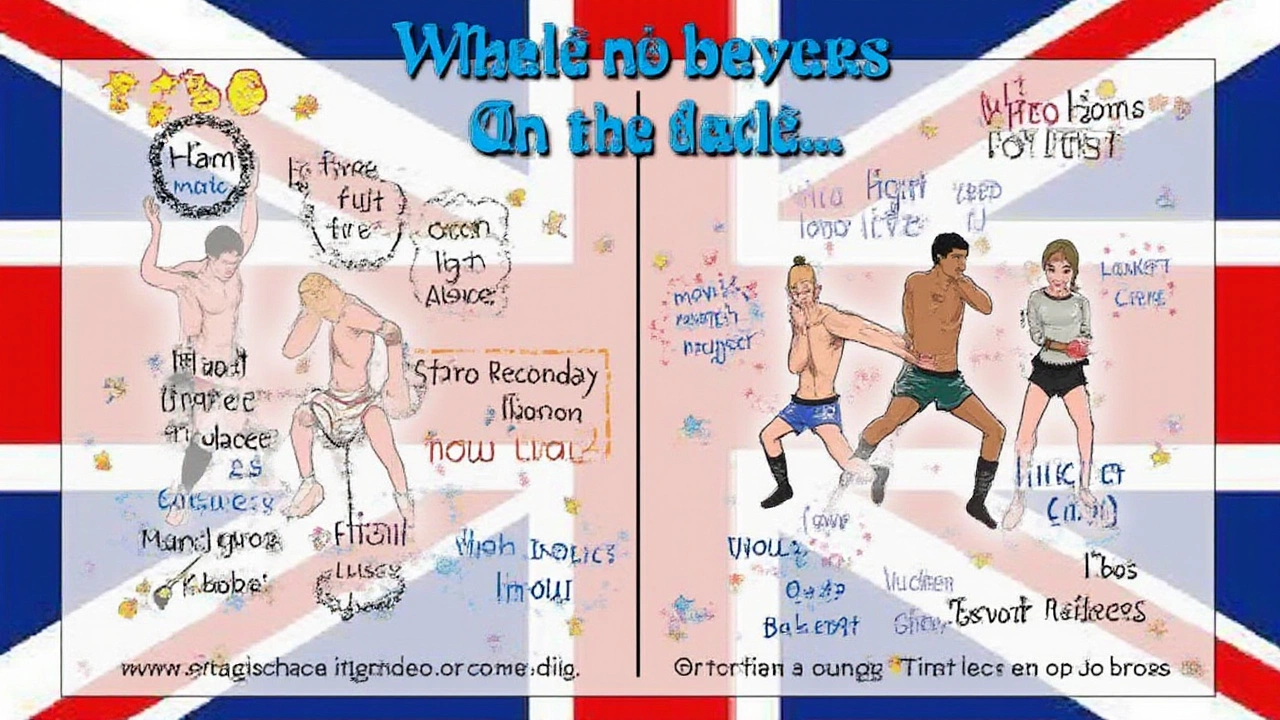Boxing Match vs Fight: Which Term Should You Use?
 Jul, 22 2025
Jul, 22 2025
You’re sitting at your buddy’s house, chips in hand, ready for the main event. Suddenly, someone asks, “Is it a boxing match or a fight?” It sounds trivial, but this little language puzzle pops up more than you think. Some people use both words like they’re totally interchangeable. Others insist there’s a big difference. Turns out, there’s a surprising amount of history and meaning packed into those two words. Your ringside banter might reveal more than you realize about how you see the sport—and what you expect from it.
The Origins of "Match" and "Fight" in Boxing
Let’s rewind to the beginning: the word "match" goes way back. In the 1700s, British newspapers talked about boxers arranging a "match" as if it was a gentlemanly contest—less about chaos, more about rules and structure. Back then, matches were considered legit sports events, usually with money on the table and the local gentry watching. Today, if you say "match," you’re nodding to boxing’s organized, professional side. The referee, the judges, the sanctioned rounds—all the details that separate boxing from barroom brawls.
Now, "fight"? That’s got a different flavor. Saying "fight" immediately brings up images of scrappy, bare-knuckle battles—two people standing toe to toe, figuring things out with their fists. It sounds raw, primal, less polished. Before organized rules took over in the late 1800s, most boxing contests were called "fights." The term has always had an edge. Even now, the word “fight” gets fans hyped. Just think of phrases like "heavyweight fight night"—doesn’t that sound like can’t-miss TV?
But language is slippery. Words evolve. As boxing got more commercial, “fight” didn’t just stick around—it powered up, riding on the excitement and drama people felt. Promoters love to use “fight” in advertising, because it promises action. Yet in contract talks or media briefings, you’ll hear “match” much more (try reading an official bout agreement; they rarely say "fight").
It’s even more interesting when you compare boxing to other sports. No one says “football fight” or “tennis fight.” So why does “boxing match” sometimes seem less dramatic? Are we drawn to the word that promises more chaos? Maybe. But officially, you’ll see both terms in the sport—sometimes even in the same sentence. According to boxing historian Mike Silver, the split is about tradition vs. emotion, not just accuracy.
And let’s not forget pop culture. Search old movie posters or listen to HBO commentary, and you’ll notice “fight” is short, snappy, punchy—the word people remember. Fighters themselves use both, but many prefer “fight” when talking about stepping in the ring: “I have a fight lined up this Saturday.” Quick, gritty, real.
All this nuance gives the sport character. If you say “boxing match,” you’re leaning on history and order. Say “fight,” and you’re channeling adrenaline. That tiny choice says a lot about what you expect from boxing itself.
When to Say “Boxing Match” vs. “Fight”
So, when’s the right time to use each word? Let’s clear up the confusion. You’ll notice TV presenters bounce between “match” and “fight” all night long. But in official boxing circles, there’s a pattern. Usually, “match” is for the scheduled, structured contest between two boxers. “Fight” is for the actual event when fists start flying.
Here’s an example: A promoter will announce, “The match between Tyson and Holyfield is set for July.” When the day comes, commentators switch to, “The fight starts in five minutes!” If you’re reading a bout contract or a card listing, it's likely a “match.” Listening to fans or sportswriters? It’s all about the “fight.”
The lines can blur with casual conversations, too. When I talk with my spouse Ava about plans for the weekend, she’ll say, “Are you watching the match tonight?” But when the bell rings, she’s yelling, “This is the fight of the year!” You catch the vibe difference immediately. “Match” is what you put on your calendar. “Fight” is what makes you jump off the couch.
There are moments when it really matters which one you use. For instance, coaches and gyms will use “match” to describe amateur bouts—where rules, headgear, and scorecards matter. Professional leagues do the same. But “fight” gets used more when hype or drama is on the line: in commercials, on social media, in YouTube titles, and highlight reels.
There’s a grey area: sometimes you’ll hear “boxing fight” to make doubly sure everyone knows this isn’t MMA, kickboxing, or something else with gloves. But even in those sports, “fight” is king. The only true taboo: calling a street punch-up a “boxing match.” That’ll get you some weird looks from anyone who actually boxes or follows the sport.
If you really want to sound like you know your stuff, pay attention to context. In interviews and official documents, use “match.” If you’re talking with fans during a pay-per-view event or commenting online, lean into “fight.” Either way, nobody will throw you out of the bar—unless you mix up “fight” and “wrestling,” and then you’re on your own.
Let’s try a little tip: Next time you’re chatting, listen to how people around you use the words. Boxing gyms and coaches almost always say “match” when coaching kids; meanwhile, your friends probably just want to know when the next big “fight” is on. Context is everything. Choose the word that fits the moment and the crowd.

Why Language Choices Matter in Boxing
This isn’t just about grammar—it’s about how people see the sport. When fans call it a “fight,” they’re looking for blood, guts, and knockout drama. Say “match,” and you’re respecting the rules, technique, and athleticism that keep boxing from turning into backyard chaos.
Language also signals credibility. Journalists get careful: boxing columns in major outlets use “match” for schedules but groan out “fight” for narratives. Promoters love the energy “fight” brings but know “match” makes them sound official. If you scroll Twitter during a big bout, you’ll see hashtags both ways: #boxingmatch, #fightnight, #Matchroom, #ReadyToFight. Which ones trend? It’s usually “fight”—because people want excitement, not a spreadsheet.
Here’s something interesting. Different countries lean into different words. In the UK, “boxing match” surfaces more often in mainstream media. In the US, “fight” is everywhere, thanks in part to the Las Vegas “fight night” tradition. Spanish-speaking fans blend both, but “pelea” (fight) wins social media every time. There’s a sense in language that goes beyond rules—it’s about what fans crave.
But there’s more at stake: the language you use shapes how newcomers see the sport. Call it a “fight,” and they picture sweat, bruises, even danger. Say “match,” and you highlight discipline, strategy, and training—things that attract young athletes (or their cautious parents). Think about the message you’re sending if coaching, writing, or promoting the sport.
I’ve learned this the hard way. When my nephew first started boxing, his mom (my sister) clammed up every time someone called it a “fight.” It sounded rough. But when she realized his club described every contest as a “match,” she relaxed. Same thing happened with Ava—she got more comfortable after hearing about the rules and safety standards, reinforced by the word “match.”
It’s funny, but switching a single word changes people’s reactions, attitudes, and even whether they’ll support the sport at all. Your wording also shows what you value about boxing. Are you in for flashy TV knockouts, or does the technique keep you coming back?
The Psychology Behind Calling It a Match or a Fight
So why do we gravitate to one word or the other? It comes down to psychology. Human brains react faster to words packed with emotional energy—think “fight or flight.” The word “fight” sets off adrenaline, triggers excitement, and amps up attention. That’s why promoters never shy away from it on posters or pay-per-view banners. There's research showing viewers remember dramatic terms more than neutral ones when recalling TV or sporting events, so the sport’s marketers know what they’re doing.
But sometimes, too much aggression can turn people off. Using “match” can calm nerves, especially when you’re talking to families, sponsors, or newcomers. It frames boxing as skill and discipline, not just violence. A coach once told me that gym sign-ups shot up after local papers started covering “boxing matches” instead of “fights.”
The impact goes further. Even inside the ring, self-talk changes with the word. Some fighters say, “I’m going into a match,” to steady themselves—emphasizing precision and focus. Others fire themselves up with, “I’m ready for this fight!” It’s about channeling energy, either toward control or wild energy, depending on what they need that day.
Culturally, the difference does real work. The International Boxing Association (AIBA) officially uses “match” in its rulebooks and press releases, appealing to Olympic tradition and sportsmanship. Meanwhile, pro boxing’s megastars and PPV headliners talk up the “fight of the decade,” feeding into what fans pay to see. Even the sports betting world pays close attention—the term “fight odds” pulls thousands more search clicks each week than “match odds.”
If you want to test your own bias, try this thought experiment: Which sounds more dangerous—"He’s got a match Saturday" or "He’s got a fight Saturday"? Studies in sports media have shown that people actually rate the second one as riskier, even when it’s the same event. Our brains just react differently, based on the word alone.
The language you choose, even for the same event, can shape how people respond—whether they think of strategy or just swinging fists. That little difference can change how you talk about boxing in your own circle or even how you sell it to sponsors, schools, or the next wave of up-and-coming boxers.

Final Tips: Using the Right Term Like a Pro
Ready to pick a side, or at least sound like you know what you’re talking about? Here’s how you nail the language every time. If you’re scheduling, reporting, or talking rules, use “boxing match.” It shows respect for the sport’s structure. If you’re hyping, chatting, or calling out an epic moment, let “fight” rip. In casual talk or on social media, “fight” will get more attention and excitement.
If you want to get super specific, watch how experienced boxers or trainers do it. Pros use “match” when they’re in training mode, prepping or discussing tactics. When the adrenaline kicks in, “fight” takes over. Try it out: next time the main event is coming up, text your group chat, “Who’s got the fight tonight?” Then, talk up the rules or undercard by saying, “I’m looking forward to that match.” You’ll fit right in with both circles.
And if you’re ever in doubt, ask the people around you. Some boxing gyms might have their own preferences; TV presenters and online communities do, too. If you’re writing or reporting, think about your audience. Are they die-hard fans, newcomers, or just curious? The term you choose helps them connect.
One last thing—remember that whichever word you use, you’re adding to boxing’s long, weird story of tradition and adrenaline. Neither is wrong, but each has a vibe all its own. Choosing between "boxing match" and boxing fight is like picking your corner in the ring—each word gets you ready for a different kind of night. And if you’re ever in doubt, just yell “Let’s go!” when the first bell rings. Nobody argues with that.